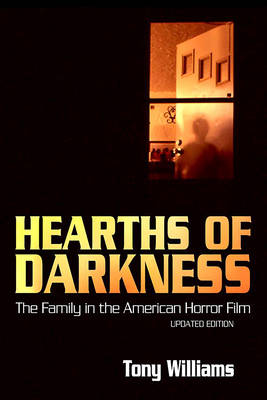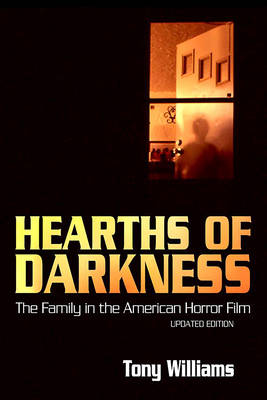
Onze Vivlio e-readers ondervinden momenteel synchronisatieproblemen. We doen er alles aan om dit zo snel mogelijk op te lossen. Onze excuses voor het ongemak!
- Afhalen na 1 uur in een winkel met voorraad
- Gratis thuislevering in België vanaf € 30
- Ruim aanbod met 7 miljoen producten
Onze Vivlio e-readers ondervinden momenteel synchronisatieproblemen. We doen er alles aan om dit zo snel mogelijk op te lossen. Onze excuses voor het ongemak!
- Afhalen na 1 uur in een winkel met voorraad
- Gratis thuislevering in België vanaf € 30
- Ruim aanbod met 7 miljoen producten
Zoeken
Hearths of Darkness
The Family in the American Horror Film, Updated Edition
Tony Williams
Paperback | Engels
€ 43,45
+ 86 punten
Uitvoering
Omschrijving
A THOROUGH STUDY OF A MOVIE GENRE THAT REACHED ITS CULTURAL ZENITH IN THE 1970S BUT REMAINS INFLUENTIAL TODAY Hearths of Darkness traces the origins of the 1970s family horror subgenre to certain aspects of American culture and classical Hollywood cinema. Far from being an ephemeral and shortlived genre, horror actually relates to many facets of American history from its beginnings to the present day. Individual chapters examine aspects of the genre, its roots in the Universal horror films of the 1930s, the Val Lewton RKO unit of the 1940s, and the crucial role of Alfred Hitchcock as the father of the modern American horror film. Subsequent chapters investigate the key works of the 1970s by directors such as Larry Cohen, George A. Romero, Brian De Palma, Wes Craven, and Tobe Hooper, revealing the distinctive nature of films such as Bone, It's Alive, God Told Me, Carrie, The Exorcist, Exorcist 2, and The Texas Chainsaw Massacre, as well as the contributions of such writers as Stephen King. Tony Williams also studies the slasher films of the 1980s and 1990s, such as the Friday the 13th series, Halloween, the remake of The Texas Chainsaw Massacre, and Nightmare on Elm Street, exploring their failure to improve on the radical achievements of the films of the 1970s. After covering some post-1970s films, such as The Shining, the book concludes with a new postscript examining neglected films of the twentieth and early twenty-first century. Despite the overall decline in the American horror film, Williams determines that, far from being dead, the family horror film is still with us. Elements of family horror even appear in modern television series such as The Sopranos. This updated edition also includes a new introduction. Tony Williams, Carbondale, Illinois, is a professor of English and area head of film studies in the English Department at Southern Illinois University. His recent books include The Cinema of George A. Romero: Knight of the Living Dead; John Woo's "Bullet in the Head"; and George A. Romero: Interviews (published by University Press of Mississippi).
Specificaties
Betrokkenen
- Auteur(s):
- Uitgeverij:
Inhoud
- Aantal bladzijden:
- 360
- Taal:
- Engels
Eigenschappen
- Productcode (EAN):
- 9781628461077
- Verschijningsdatum:
- 1/12/2014
- Uitvoering:
- Paperback
- Formaat:
- Trade paperback (VS)
- Afmetingen:
- 152 mm x 229 mm
- Gewicht:
- 544 g

Alleen bij Standaard Boekhandel
+ 86 punten op je klantenkaart van Standaard Boekhandel
Beoordelingen
We publiceren alleen reviews die voldoen aan de voorwaarden voor reviews. Bekijk onze voorwaarden voor reviews.











